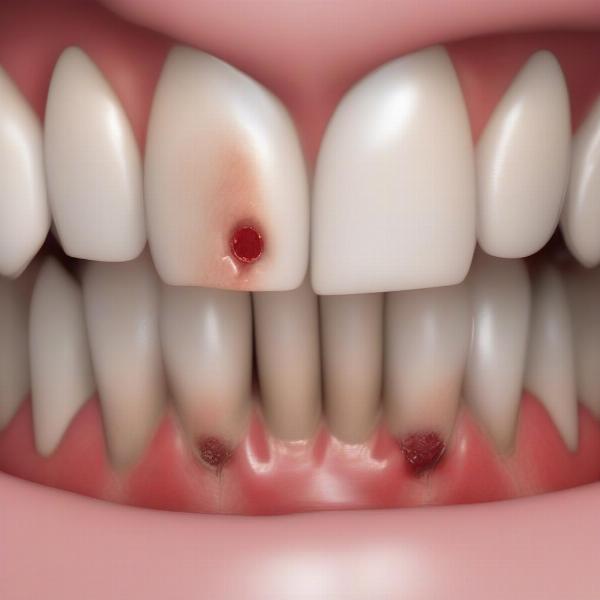Bleeding gums in dogs can be alarming for any pet owner. While some causes are minor, others can indicate serious health problems. Understanding the reasons behind dog gums bleeding, how to treat it, and preventative measures can help you ensure your furry friend’s oral and overall health.
Why are My Dog’s Gums Bleeding?
Several factors can contribute to dog gums bleeding. Some of the most common include:
- Gum disease (Gingivitis and Periodontitis): This is the most frequent cause. Plaque and tartar buildup irritate the gums, causing inflammation (gingivitis) and potentially leading to infection and bone loss (periodontitis). Bleeding gums are often an early sign of gum disease.
- Injury: Chewing on hard objects, like bones or toys, can cause trauma to the gums, leading to bleeding. Even a small cut can bleed significantly in the mouth.
- Teething: Puppies experience bleeding gums during teething as their adult teeth emerge.
- Blood clotting disorders: Certain medical conditions can affect blood clotting, making even minor gum injuries bleed excessively.
- Oral tumors: While less common, tumors in the mouth can cause gum bleeding.
- Systemic diseases: Some diseases, like diabetes and kidney disease, can manifest as bleeding gums.
- Toxicity: Ingesting certain toxins, such as rat poison, can interfere with blood clotting and lead to bleeding gums.
 Close-up of Dog Gums Bleeding
Close-up of Dog Gums Bleeding
What to Do if Your Dog’s Gums are Bleeding?
If you notice your dog’s gums bleeding, it’s important to:
- Assess the situation: Try to identify the cause. Is there a visible injury? Are the gums inflamed? Is your dog behaving normally otherwise?
- Contact your veterinarian: Even if the bleeding appears minor, it’s always best to consult with a vet to rule out any underlying health issues. dogs gums bleeding provides a detailed overview of the causes, symptoms, and treatment options.
- Follow your vet’s instructions: Your vet may recommend a professional dental cleaning, prescribe antibiotics for infection, or suggest other treatments depending on the cause of the bleeding. They may also recommend magic mouthwash for dogs for certain conditions.
- Monitor your dog: Keep a close eye on your dog’s gums for any changes in color, swelling, or continued bleeding.
Preventing Dog Gum Bleeding
Maintaining good oral hygiene is crucial for preventing bleeding gums in dogs. Here are some preventative measures:
- Regular brushing: Brush your dog’s teeth daily using a dog-specific toothpaste.
- Dental chews and treats: Provide dental chews and treats to help remove plaque and tartar. dog teething gel can also help soothe teething puppies.
- Professional dental cleanings: Schedule regular professional dental cleanings with your veterinarian.
- Healthy diet: A balanced diet contributes to overall health, including oral health.
- Avoid hard objects: Discourage your dog from chewing on hard objects that could injure their gums.
Is Bleeding Gums in Dogs Serious?
While some instances of bleeding gums might be minor, it can also be a sign of serious underlying health conditions like dog splenectomy related complications or require interventions like teething gel dogs. Ignoring bleeding gums could lead to more severe problems like tooth loss, infection, and even systemic illness.
Conclusion
Bleeding gums in dogs warrant attention. By understanding the potential causes, knowing what steps to take, and implementing preventative measures, you can help protect your dog’s oral health and overall well-being. Regular veterinary checkups and consistent oral hygiene practices are essential for a healthy, happy smile for your furry friend.
FAQ
- How can I tell if my dog has gum disease? Signs include red, swollen gums, bad breath, difficulty chewing, and loose teeth.
- Is it normal for puppy gums to bleed? Some bleeding is normal during teething, but excessive or prolonged bleeding should be checked by a vet.
- What should I do if my dog’s gums are bleeding a lot? Seek immediate veterinary attention.
- Can I use human toothpaste on my dog? No, human toothpaste contains ingredients that are toxic to dogs. Always use dog-specific toothpaste.
- How often should my dog have a professional dental cleaning? Your vet can recommend a schedule based on your dog’s individual needs.
- Are there any home remedies for bleeding gums in dogs? Consult your veterinarian before trying any home remedies.
- Can diet affect my dog’s gum health? Yes, a balanced diet is crucial for overall health, including oral health.
ILM Dog is your trusted source for comprehensive information on dog care and wellbeing. We offer expert advice on everything from breed selection to health, training, nutrition, and more. With a focus on providing practical and reliable information, ILM Dog empowers dog owners worldwide to provide the best possible care for their canine companions. Whether you’re a new dog owner or a seasoned expert, we’re here to support you every step of the way. Contact us today for personalized advice: Email: [email protected], Phone: +44 20-3965-8624. Visit us at ILM Dog for more information.